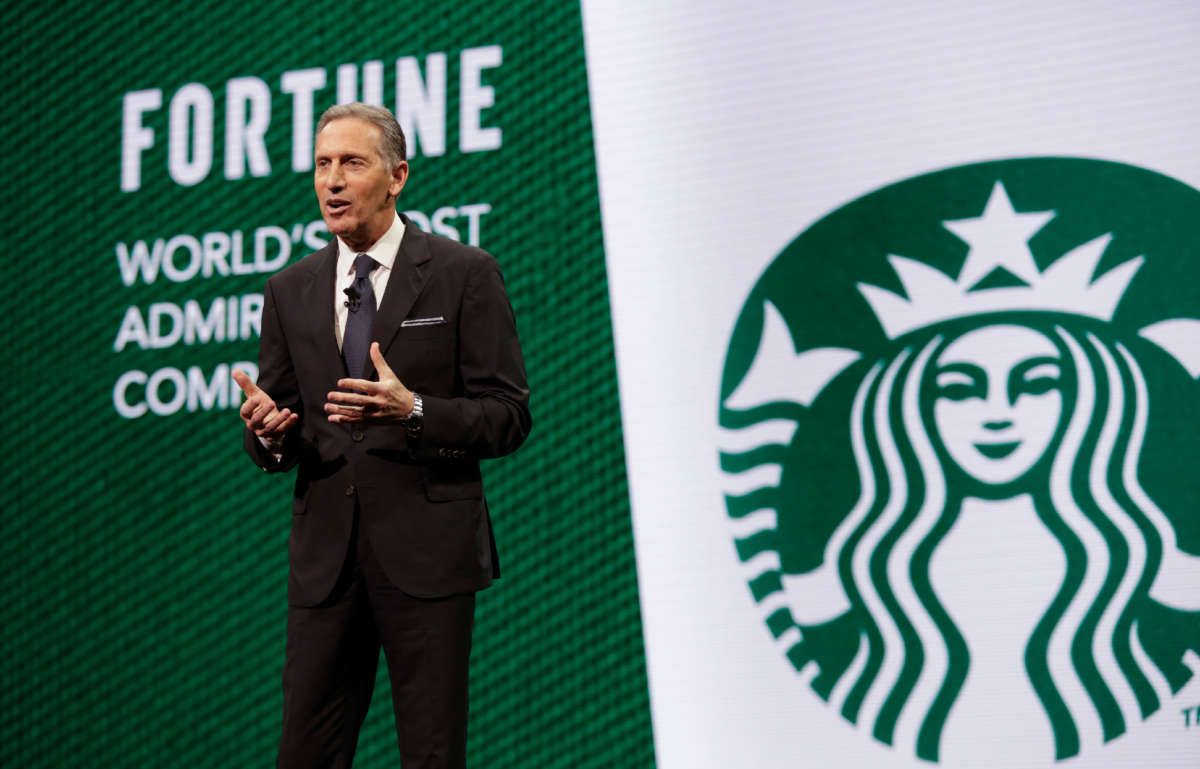On Wednesday, Starbucks announced that it will be replacing CEO Kevin Johnson with former CEO Howard Schultz as interim chief executive, a move that union organizers say is meant to directly target their union drive.
In a press call with Congressional Labor Caucus members on Wednesday, union organizers said that they’re wary of Schultz and his anti-union attitude. They say that Schultz has told organizing workers that the union drive is a personal insult to him.
“I think it’s very clear why they brought Howard back in,” said Starbucks Workers United organizer and Buffalo employee Casey Moore. The board believes that “Howard is the only person who can convince workers to not unionize,” Moore said.
Buffalo worker and union organizer Jaz Brisack said that Schultz is “coming out of the shadows to lead this fight against the union.” Brisack noted that when the New York workers began their campaign, the company brought out a “Buffalo SWAT team” made up of company executives to fight the union, including Schultz.
Indeed, Starbucks board chair Mellody Hobson said on CNBC on Wednesday that Schultz is “singularly capable of engaging with our people in a way that will make a difference.” During the company shareholder meeting the same day, Hobson said that the company will not take a neutral stance on unionizing, as major shareholders have requested, because it would limit “our ability to speak to our partners in certain ways.”
Starbucks Workers United has asked Schultz to sign onto the group’s “Fair Election Principles” asking for non-interference during the union campaign. Labor Caucus co-chair Rep. Donald Norcross (D-New Jersey) echoed that appeal in the press call on Wednesday. “Howard, do the right thing here,” Norcross said. “Give these workers a voice.”
Though Schultz stepped down from CEO in 2017, he has been involved with the company as executive chairman and traveled to Buffalo last year to convince workers to turn against their then-nascent union campaign. In a speech, Schultz bizarrely compared the company to Holocaust victims and repeatedly referenced workplace issues that unionizing workers had complained about.
Schultz, who likely would have been the U.S. Labor Secretary if Hillary Clinton had won the presidency in 2016, has had a decades-old record of being against unions at Starbucks. In his 1999 memoir about leading the company, Schultz wrote that he views unionization as an affront to him and his leadership. “I was convinced that under my leadership, employees would come to realize that I would listen to their concerns. If they had faith in me and my motives, they wouldn’t need a union,” he wrote. Schultz stepped down as CEO in 2000 and returned from 2008 to 2017.
Starbucks workers have tried to unionize before — drives in the Pacific Northwest in the late 1990s and early 2000s and in New York in the late 2000s faced strong opposition from the company, which was led by Schultz during many of those years. Labor leaders at Seattle Starbucks stores and a local roasting plant that were unionized in the late ‘80s, when Schultz first took ownership of the company, said that Schultz was extremely hostile toward them.
The first time Pam Blauman-Schmitz, local union representative for the United Food and Commercial Workers, visited the plant under Schultz’s leadership in the late ‘80s, “He went ballistic screaming at me, telling me to get out of the plant,” Blauman-Schmitz told The New York Times. “He followed me all the way out.”
However, the current union campaign, which has already led to six unionized stores, is the largest the company has ever faced. About 145 stores have filed to unionize so far, and the filings are coming in at an incredibly fast rate — just a few weeks ago, the union was celebrating having gotten filings from over 100 stores.
As the union campaign has grown, the company’s union-busting moves have gotten bolder. Starbucks recently began cutting hours across the board for employees, a move that workers say is meant to financially and psychologically manipulate pro-union employees.
On Wednesday, workers met with the Congressional Labor Caucus and asked lawmakers to increase the pressure campaign against Starbucks. The company’s stock has fallen over the past six months, and shareholders have asked the company to lighten its stance on the union in part because the campaign has been bad for publicity.
“No workers should go through what we’re going through,” said Brisack. The workers joined the caucus in calling for the passage of the Protecting the Right to Organize (PRO) Act, which would clear the path for unionizing workers in the U.S. and place harsher penalties on union-busting employers.
Speaking against the authoritarian crackdown
In the midst of a nationwide attack on civil liberties, Truthout urgently needs your help.
Journalism is a critical tool in the fight against Trump and his extremist agenda. The right wing knows this — that’s why they’ve taken over many legacy media publications.
But we won’t let truth be replaced by propaganda. As the Trump administration works to silence dissent, please support nonprofit independent journalism. Truthout is almost entirely funded by individual giving, so a one-time or monthly donation goes a long way. Click below to sustain our work.
